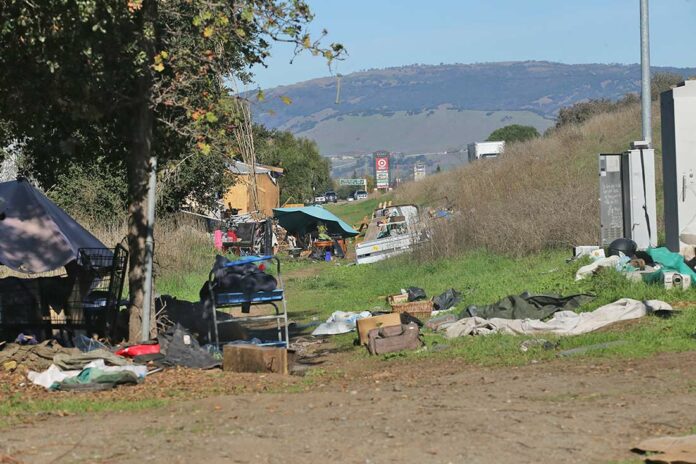The Gilroy Police Department got the OK from the city council on July 5 to enforce no-camping ordinances on public property, but it comes with a number of caveats that may render the decision moot.
Those experiencing homelessness, however, say the limited shelter options in Gilroy leave them nowhere else to go.
Outright bans on outdoor camping have been largely prohibited across the U.S. and in Gilroy since the Ninth District Court of Appeals ruled in 2019’s Martin v. City of Boise that outdoor public camping cannot be criminalized unless the individuals are given an alternative shelter option.
Hearing concerns from many residents on the growing number of encampments in Gilroy prompted officials to consider their options within the parameters of the court’s decision.
Police Chief Pedro Espinoza said the city’s two quality of life officers visit the encampments to see what, if any, services the unhoused individuals are receiving from providers. The officers then offer to connect the person to a provider if they are not receiving any services.
Espinoza said the officers seek voluntary compliance from the individuals to vacate a property, and added the goal is not to displace anyone as “from our experience, the problem often continues.”
City Attorney Andy Faber said the Boise case “sent shockwaves through public agencies,” as it implied that a city had to completely solve its homelessness issue before it could enforce no-camping ordinances.
But it includes some fine print that could allow a city to enforce the ordinances without facing lawsuits, he noted.
“There are a lot of complications and I don’t want to imply that this is a simple process at all,” Faber said. “But it appears that under the law if Gilroy desires to enforce a no-camping ordinance…we can do that, if we provide adequate shelter and if it is available.”
Availability is hard to come by, homeless advocates say.
Jan Bernstein Chargin said anyone can call the shelter hotline at 408.385.2400 and ask if there are any beds available in Gilroy. The answer, she said, will be the one she hears daily: no.
Bernstein Chargin said she is attempting to find a woman, who is being harassed on the streets, a place to shelter, but she’s been on a waiting list for about a month.
“The system is overwhelmed,” she said. “The reason why the shelters are full, and the reason why there’s a months-long waiting list is because people want shelter. The barrier to shelter is the lack of beds.”
Toni-Jo Napihaa said she’s been homeless for the past decade, despite holding a job for the last 20 years.
“Something is broken and something needs to be fixed,” she said. “I’m tired of being on the street. I don’t know about anyone else, but I don’t want to be there anymore, and I bet a lot of them don’t want to be there either, but they don’t know how.”
Kim Summers said she’s worked her “whole life,” but has been homeless for 10 years, struggling with health issues and trying to find a shelter.
“I just couldn’t afford my apartment anymore,” she said. “I don’t want to be out here.”
Mike Conrotto, the owner of the former Orchard Supply Hardware building on 10th Street that now houses Gilroy Motorcycle Center, said the area on Ninth Street behind the building has had problems for years with individuals selling drugs, leaving trash behind and using “bushes as their bathroom.”
He suggested the city create a sanctioned encampment for the homeless trying to get back on their feet.
“We need to put these people in an encampment where they can be protected,” Conrotto said.
Councilmember Dion Bracco said the city needs to “be more vocal and put pressure on the county,” suggesting having drug rehabilitation and mental health services at the county-owned St. Louise Regional Hospital will go far toward solving some of the issues.
He added that if nothing changes, a major incident is bound to happen, pointing to the number of encampments that line Highway 101 near Leavesley Road.
“Something’s going to happen sooner or later,” he said. “One day, a car or truck is going to come off that highway and it’s not going to be pretty.”
Bracco suggested the city reconvene its homeless ad hoc committee, which formed in late 2020 with himself and Councilmembers Carol Marques and Fred Tovar as members. Tovar, however, said the committee had already discussed the topics that Bracco brought up, but Marques said they “have to go further.”
“All we do is talk and talk and massage the issue,” she said. “Why is the public so angry? They’re angry because they’re tired of looking at all the garbage, they’re tired of seeing people walking down the streets screaming and hollering.”
She said many of the homeless people who have family members with housing need to “go home and get help.”
“Living with a family member is a lot better than living on the streets,” Marques said.
Councilmember Rebeca Armendariz, however, said the city should not be making any assumptions about a person’s family situation, adding that many unhoused individuals would dispute Marques’ claim.
She agreed that while the county can do a better job in providing resources, “so can we,” pointing to the council’s earlier decisions to purchase a garbage truck to clean up encampments and to reject a bid for a safe parking program.
“What kind of resources did we dedicate to the homeless?” Armendariz said. “We bought a garbage truck. We hired two quality of life officers, for what? Criminalization? It certainly hasn’t housed anybody.”
On a 5-2 vote, with Councilmembers Zach Hilton and Armendariz dissenting, the council agreed to allow police to enforce the no-camping ordinances on public property, if there is sufficient shelter space available.
On a separate unanimous vote, the council agreed to discuss options for “safe camping” on city property at a future meeting.












